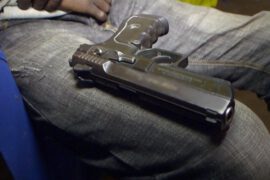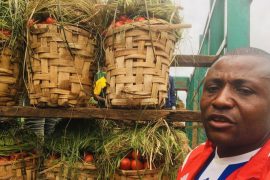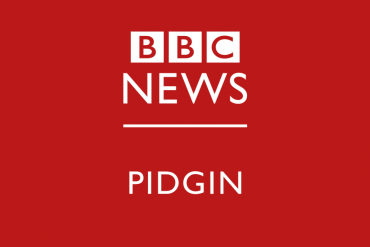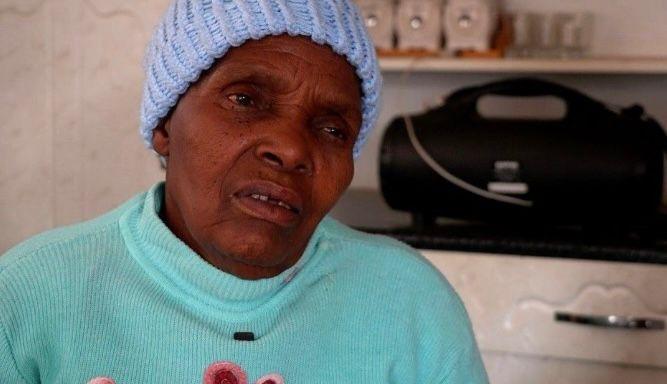
Na sharp climb from di main road to 79-year-old Matlohang Moloi home, through di mountains wey make Lesotho one of di highest kontries in di world.
Di mother of 10 welcome me to her neat house, showing me photos of her large family. I dey here to tok about one of her children in particular – her firstborn son, Tlohang.
At 38 he become part of a one bad statistic. Lesotho, di kingdom in di sky, na home to di world highest suicide rate.
“Tlohang na good son. Im bin don tell me about im mental health struggles,” Ms Moloi tok.
“Even dat day wey im take im own life, im bin come to me say, ‘mother, one day you go hear say I don take my life’.
“Im death pain me well-well. I really wish say e bin explain in more detail wetin bin dey trouble am for im mind. Im bin dey worried say if im tell pipo dem go think say im be weak pesin wey no fit solve im own problems.”
- One year afta Niger coup, how di kontri don cope?
- Sextortion and blackmail on di rise for Ghana – tips to avoid falling victim
- Miss South Africa organisers respond to critics about Chidimma Adetshina qualification to contest
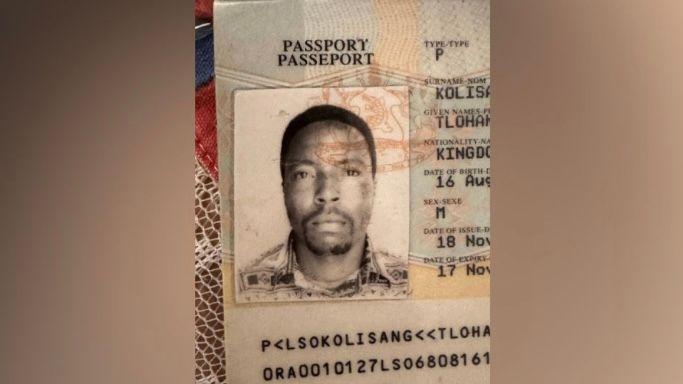
According to World Health Organization, 87.5 pipo per 100,000 of di population dey take dia own life evri year for Lesotho.
By contrast, dat na more dan double di next kontri on di list, Guyana for South America, wia di figure dey just over 40.
E dey also almost 10 times of di global average, wey stand at nine suicides per 100,000 pipo.
Dat na one statistic wey NGOs – such as HelpLesotho – dey determined to change, by equipping young pipo with di skills to manage dia mental health.
For di town of Hlotse, about two hours drive from di capital, Maseru, I sidon listen to one of di regular group therapy sessions for young women, wey one social worker Lineo Raphoka dey run.
“Pipo think say e dey against our African principles, our cultural experiences, against our spirituality as Africans, and as a community at large,” 24-year-old Patience tell di group.
“But we also dey shy away from di fact say e dey happen. I dey tok from a perspective wia I don lose three friends from suicide, I personally don attempt am.”
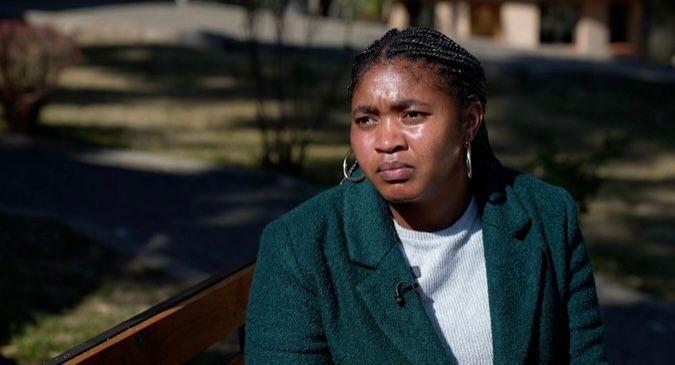
Everybody here don experience suicidal thoughts, or know someone wey don die by suicide.
Thirty-five-year-old Ntsoaki dey emotional as she tell di group her story of how dem rape her for hospital.
“Di doctor tell me say I dey too attractive. Den im bring out gun and tell me im wan have pleasure with me, and if I no gree im go kill me.
“Evri time with suicide, I always think say na im be di only solution. I no fit do am, I no get di strength to do am. Di only thing wey keep me moving or alive na di faces of my brothers. Dem believe say I dey strong, but I dey weak.”
Di group reassure her say she dey strong for sharing her feelings.
As di session finish, all di women dey chat and smile togeda as dem say dem feel better for sharing dia stories.
Di reasons pipo take dia own lives often dey complicated, and e dey difficult to isolate a single cause. Despite dat wan, Ms Raphoka say she dey see patterns wey explain why Lesotho in particular get such a high suicide rate.
“Mostly dem dey go through situations such as rape, unemployment, loss becos of death. Dem dey abuse drugs and alcohol.”
According to a World Population Review report for 2022, 86% of women in Lesotho don experience gender-based violence.
Meanwhile, di World Bank say two in five young pipo no get employment or education.
“Dem no dey get enof support from dia families, friends or any kind of relationships wey dem get,” Ms Raphoka continue.
Dis na sometin you go often hear for Lesotho. Pipo say time and again say dem no feel comfortable to tok about dia mental health – and say odas fit judge dem.
Sitting for one bar for Hlotse one evening, wia di male clients dey drink local beer and chat politics while football dey play on di TV, I shift di conversation towards mental health.
“We dey tok about am, we say make we open up,” Khosi Mpiti tell me.
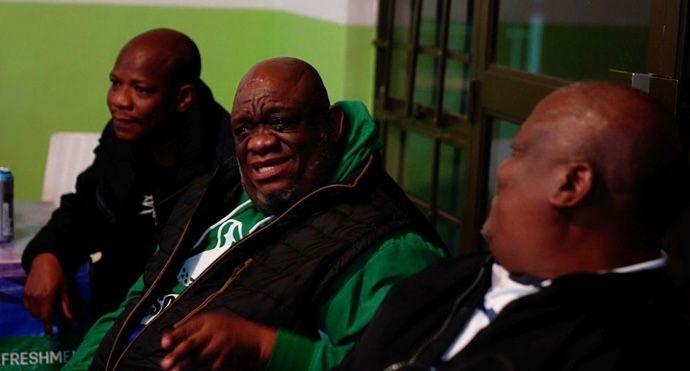
Some dey afraid say if dem reveal too much, pipo go gossip dem, but despite dis, e say tins don dey get better.
“As a group [of friends] we dey very supportive. If I get problem, I tell di group, and we support each oda.”
Even wen pipo seek help, dem dey face a struggling public health system.
Last year, di only psychiatric unit for di kontrI bin dey criticised by di ombudsman – one official wey dia main job na to look after public interests – say dem no get a psychiatrist since 2017. She also highlight widespread abuses, including “living conditions wey violate human rights”.
Previously, dem also no get any national mental health policy to deal with di crisis, although di goment – wey dem elect for October 2022 – say dem currently dey in di process of drafting one.
“Mental health don become a pandemic,”na so Mokhothu Makhalanyane admit, one MP wey dey lead a parliamentary committee wey dey deal with health issues.
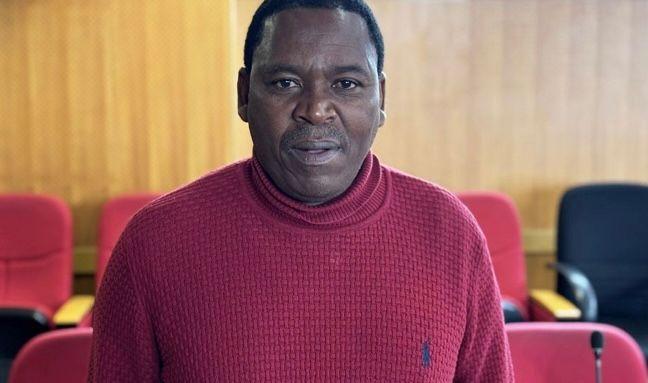
“We dey make sure say advocacy dey intensified, from primary school, to high schools, to places wia young pipo dey gada, such as football tournaments,” e tell di BBC.
“Di policy go also dey specific in terms of treatment, and e go allow those wey dey affected to go for rehabilitation.”
He also say Lesotho fit learn from dia battle against HIV/Aids.
For 2016, e become di first kontri to introduce a “test-and-treat” strategy, meaning say pipo fit start treatment as soon as dem dey diagnosed. Rates of infection don consistently fall.
“Di experience wey we get be say to tok about am openly, and not blaming or criticising di pipo for dia situation, help to turn things around.”
Back up in di mountains, Ms Moloi take di short walk to tend to Tlohang grave.
Im final resting place na a plot with fine environment, with streams, greenery and small houses.
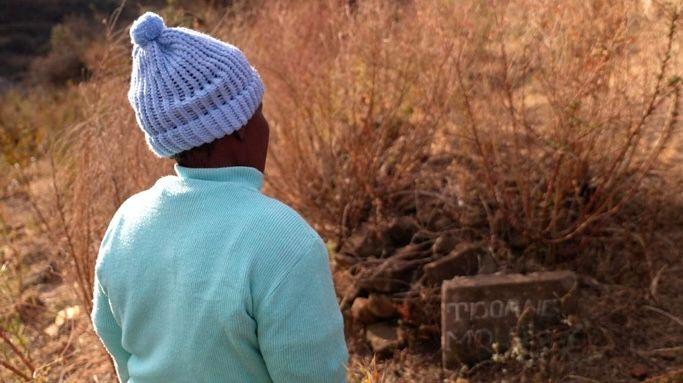
Ms Moloi na one of many pipo wey dey live for Lesotho wey dey deal with di grief of death by suicide.
As we take in di view, she say she get a message for those wey find demsefs in di same headspace as her son.
“I go tell pipo say taking your own life no ever be a solution. Wetin you need do na to tok to pipo around you so dem fit help you.”
If you dey affected by di issues for dis story and you dey suffer distress or despair and need support, you fit speak to a health professional, or an organisation wey dey offer support.

